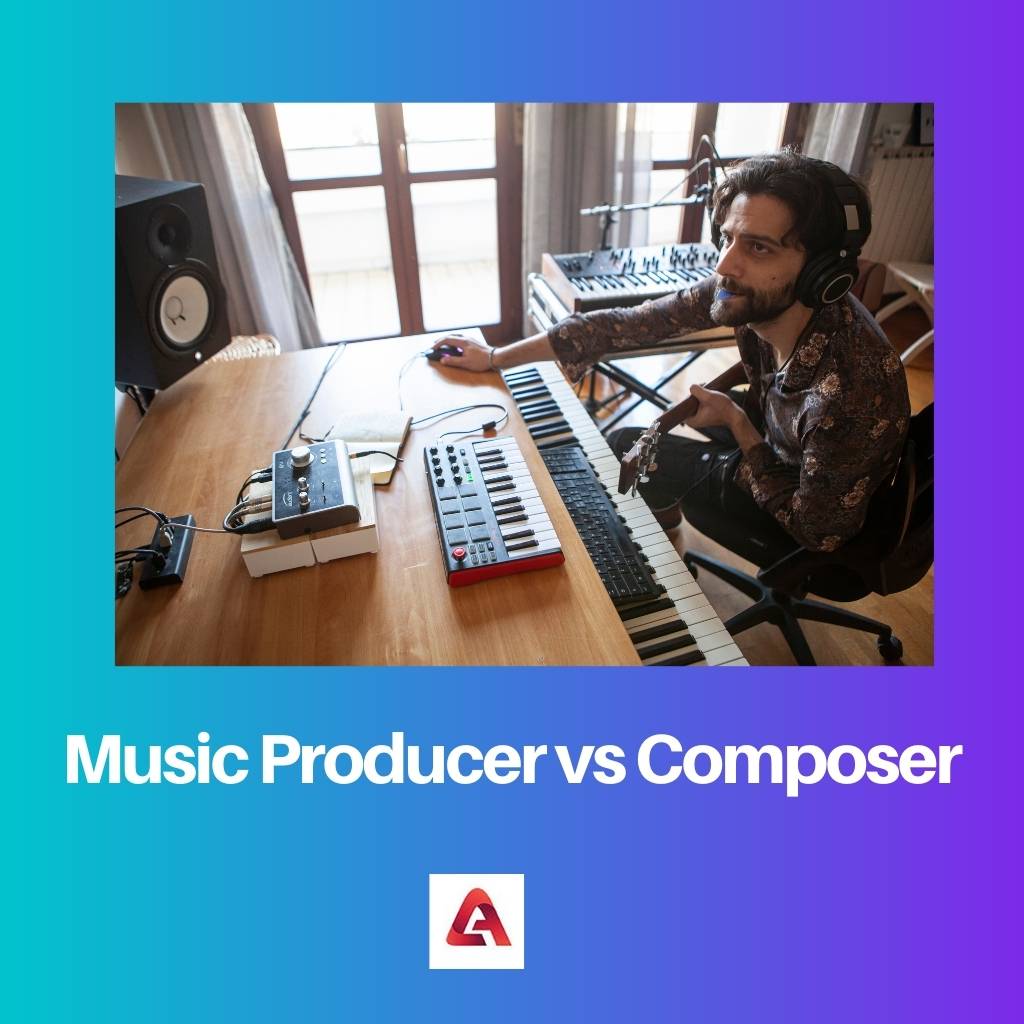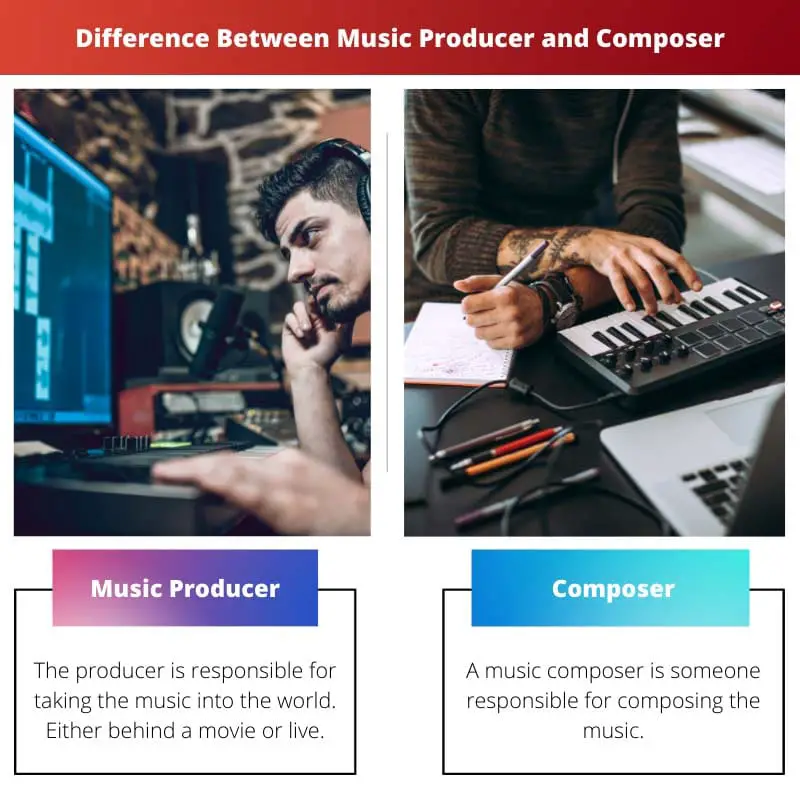Singing has been practised for ages, from Tansen, who mesmerized the world with his voice, to Arijit Singh today. Things have changed a lot.
Anyone pursuing or wanting to pursue music should know the difference between fields. The music composer and music producer also differ in some ways.
Key Takeaways
- A Music Producer oversees the recording, mixing, and mastering of a song or album, while a Composer is responsible for creating and arranging the music itself.
- A Music Producer may work with multiple artists and genres, while a Composer specializes in a particular style or genre of music.
- A Music Producer may also be involved in the creative process and contribute to the composition of the music, while a Composer’s primary focus is on writing and arranging the music.
Music Producer vs Composer
Music Producer is solely responsible for taking that music and establishing it on media and ensuring it’s as great as possible, while the composers are responsible for creating music.

A music producer is responsible for taking the music to the next level. He’s held for releasing it on social media, in movies, or live. Producers have many career paths, like producing music for a blockbuster film.
Producers mostly perform the technical side of the song.
The music composers are just involved in composing the music. Composers write music that can fit in many ways, according to the film background, concert-based music, orchestral, and even music theme of video games.
Comparison Table
| Parameters of Comparison | Music Producer | Composer |
|---|---|---|
| Definition | The producer is responsible for taking the music into the world. Either behind a movie or live. | A music composer is someone responsible for composing the music. |
| Job role | A producer ensures musicians, actors, and dancers sync on the music, hiring musicians, engineers, and overseas activities. | A music composer works on polishing the music, writing original songs, and working with other musicians for recordings and performances. |
| Creativity | Since the job and parts remain the same, producers aren’t much creative. | Composer is more creative since they devote their time to creating healthy music. |
| Expected job growth | Music production is expected to witness a job growth of 9 per cent in the overall period of 2014-2024. | Music composition is expected to witness job growth of 3 per cent in 2014-2024. |
| Examples | Some famous music producers are Ayan De, Jason D’Souza, Keshav Dhar, and Adhiraj Singh. | Some famous music composers are A.R. Rehman, Amit Trivedi, Pritam Chakraborty, Madan Mohan, and Shankar Mahadevan. |
What is Music Producer?
Music is an essential part and a vital organ for human beings.
Everything in the world follows a rhythm. From those nature sounds to anything functioning, even air gushing to winds rushing, everything is in a kind of sync that soothes the mind and rejuvenates the soul. Whether composing music or producing, we have come a long way.
A producer is responsible for the production of music creation and reviewing the music. There are many other job roles in music production.
They ensure musicians, actors, and dancers who share the same stage are in sync with the music composed. Also, he does the hiring of musicians and engineers to record sessions or manage them.
A producer isn’t much creative since the job doesn’t need to be one. Instead, his work sounds more like choosing and negotiating and cracking deals with the right musicians.
They also ensure overseas activities or live performances. They, too, ensure choreography and make sure the work is done under the provided budget and in the timeframe.
Finally, a producer ensures the composition goes live and works on the final product. They provide that the music hits every internet corner and becomes a sensation and trend. He supports the technical side of it.

What is Composer?
You must have listened to songs that have won your heart. You might have a playlist for every mood, from that workout playlist to sad song ones. We all love music and the creativity a composer shows.
Also, some songs become trending and make records on the internet.
For someone pursuing or wanting to choose music as his career, it’s necessary to be clear who’s music composer, producer, and other sectors are to ensure a better understanding of things.
A music composer works on music and works with musicians for recording or collaboration purposes.
A composer, on the one hand, has to be creative. To make songs a huge hit, a composer needs to remain updated. On the other hand, he has to keep polishing his skills. He’s responsible for creating music and compositions.
Creation isn’t a one-day thing. To be a sensational artist requires time, patience, feelings, tuning with the people, and many factors.
Most artists begin their composing journey at a younger age. They are attending music classes to teach the music world and the words.
Also, he’s responsible for writing original songs, working with lyricists for new songs, and sometimes going live or doing live performances.

Main Differences Between Music Producers and Composers
- A producer is responsible for hiring the musicians and making timelines for the artists, while a composer is solely responsible for making the best music and songs.
- A producer doesn’t need creativity, while a composer is way more creative in building a song that relates to the audience.
- A producer is responsible for managing all these things, while a composer is responsible for working with other artists and performing live sessions and recordings.
- The job growth in producing was 9 per cent in the same period (2014-24), while job growth overall in the music composing industry was 3 per cent.
- Ayan De, Jason D’Souza, Keshav Dhar, and Adhiraj Singh are good producers, while A. R Rehman, Shankar Mahadevan, and Madan Mohan are some best music composers.

- https://books.google.com/books?hl=en&lr=&id=PZ0R4_Oxr-4C&oi=fnd&pg=PR11&dq=Music+Producer&ots=cH2JXTBF9T&sig=QAUoDUzTYFkQ5LKaPspt6NaN_1A
- https://books.google.com/books?hl=en&lr=&id=spm0SSFCfDgC&oi=fnd&pg=PP11&dq=music+composers&ots=5MuEs3H3GJ&sig=WHtEUJhvmht59ivv68vmveAJeN4

The article provides a balanced comparison between music producers and composers, offering valuable insights into these roles.
Indeed, the article offers a comprehensive understanding of the unique contributions of both music producers and composers.
Absolutely, it’s refreshing to see such an informative breakdown of these professions.
The article effectively highlights the distinct characteristics of music producers and composers, facilitating a greater appreciation of their roles.
It’s evident that the article has eloquently delineated the multifaceted nature of music production and composition.
Certainly, the article offers valuable insights into the unique responsibilities of music producers and composers.
This has inspired me to explore the field of music composition in greater depth. The role of a composer seems incredibly rewarding.
I’m glad it sparked your interest! Composers indeed play a crucial role in developing the artistic integrity of music.
The article seems to downplay the creativity and artistic input of music producers. This may not accurately represent the full scope of their work.
I see your point, it does primarily focus on the technical aspects of music production.
The detailed exploration of the roles of music producers and composers truly deepens our understanding of these fields.
It’s evident that the article has rigorously examined the various aspects of music production and composition.
Absolutely, the article provides a comprehensive view of the diverse contributions of music producers and composers.
The article elegantly captures the essence of music production and composition, shedding light on the diverse responsibilities and creative aspects of these roles.
Indeed, it offers a nuanced portrayal of the multifaceted nature of music producers and composers.
The comparison table effectively delineates the contrasting responsibilities of music producers and composers, making it easier to comprehend their roles.
The article is certainly enlightening, offering a thorough analysis of music production and composition.
Agreed, the comparison table is a valuable resource for understanding the intricacies of these professions.
This article is both informative and engaging, providing a comprehensive analysis of music production and composition.
Absolutely, it’s a compelling exploration of these crucial domains within the music industry.
This article provides a great overview of the key differences between music producers and composers. It helps clear up any misconceptions.
I agree, the comparison table is particularly useful for understanding the distinction between the two roles.
The information on the expected job growth in both music production and composition is particularly insightful and relevant for aspiring musicians.
It’s valuable to consider the career prospects in these fields, and this article provides a clear outlook on the future of music production and composition.